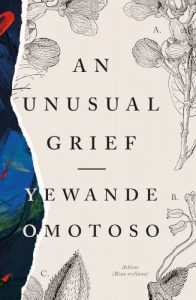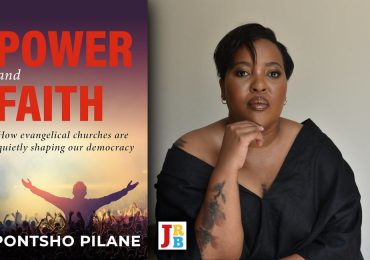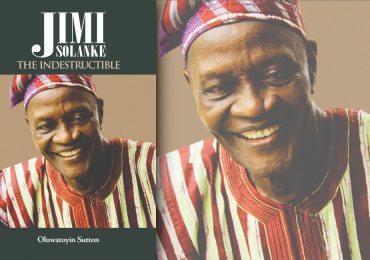The JRB’s Editor Jennifer Malec chats to Yewande Omotoso about questions, answers, and her new novel, An Unusual Grief.

An Unusual Grief
Yewande Omotoso
Cassava, 2021
Jennifer Malec for The JRB: Congratulations on your new novel, Yewande. In her cover shout, Jennifer Nansubuga Makumbi says this book ‘cements [your] position as one of the leading African novelists of our time’. So I’d like to ask, what is it like to have published a third novel in your literary career? Do you feel like an ‘established’ author?
Yewande Omotoso: Thanks Jennifer. And I’m so thankful for Jennifer’s very generous comment too. It feels like many things. On the one hand I think of Nuruddin Farah’s comment when he says (butchering the quote a bit) each time he comes to write a new novel he realises he doesn’t know how to write a novel. This from a man who’s written fifteen novels, a bushel of short fiction, plays, non-fiction and essays. I take that as a wonderful gift, to come new each time, and I emulate that. I certainly don’t feel ‘established’ but what does feel firm, third time in, is my commitment to be a writing-person, to live while writing, to work my way through life using stories as a medium. What feels firm is my promise to myself to keep building a body of work. Writing as practice versus event. But of course I also celebrate, of course I’m happy and proud of myself.
The JRB: In your Acknowledgements, you write, ‘Which comes first, the writing or the idea; as I wrote to find the story, thank you to those who waited, guided, encouraged …’ Can you talk a little bit about your novel writing process? I gather you are not a systematic plot planner …
Yewande Omotoso: That is something I heard Andrew Cowan say while I was a Fellow at Norwich Creative Writing Department. He asked it of a panel of writers. I quietly answered to myself—for me the writing comes first, it is through writing that the idea emerges. Of course I start with a hunch. With Bom Boy the hunch was, what if someone lived so isolated and on the edge of society that he had to feign illness to be touched? And then I write to find out who this person is, what really is their story. In earlier versions of Bom Boy, Leke and Oscar were the same person. In some versions Leke was a nascent serial killer. With The Woman Next Door I wanted to write about old people and bitterness and the possibility of repair, how late is too late? In An Unusual Grief, following my desire to write about death, I felt the death of a mother too close to my own story (my mother died when I was twenty-three) and so I inverted the scenario: what if I died and my mother grieved? It is purely a point to set off from and then the writing starts to answer questions. I wish I could be more systematic—I have tried!—but for whatever reason my creativity does not breathe under such conditions. My writing comes alive when I have questions, when I don’t know where I’m headed, when I’m in the dark. I once outlined a story (a version of this one) and was depressed for a week. It’s like Groucho Marx and the problem with not wanting to be a member of a club that would admit him; what’s the point of writing a book whose story I already know? There is fall-out. There are so many versions of this novel on my hard drive! Versions where Yinka and her girlfriend have a baby; versions where Titus and Mojisola take a road trip to Prince Albert on a wild goose chase. Those are hundreds, sometimes thousands, of words and many hours of research that just don’t make it in the end. I’d love a more elegant, less collateral, process but I don’t have it yet. Regardless, whatever my way, I know it always has to involve questions, not answers. Too many answers, especially at the beginning of the writing, really kill something off for me.
The JRB: Those strands sound fantastic. I’m glad I didn’t have to do the cutting.
As I was reading this book I suddenly thought: Ah, is this the great Midrand novel? It’s quite an unusual setting for a literary novel, as far as I can recall. Was there a reason you chose this city?
Yewande Omotoso: Ha ha—and what was your answer to yourself?!
The JRB: For me it’s the first entry into the pantheon of Great Midrand Fiction, yes.
Yewande Omotoso: I actually wrote an essay (for Visi magazine) about the choice of city—it was very deliberate.
[Yewande’s piece recalls the time she stayed with her father in Centurion, ‘in a house on a road called Jakkalsdraf, off another called Hendrik Verwoerd’: here is a short excerpt:]For a year, I lived in Centurion, and years later Centurion (and its cousin Midrand) are still living in me.
What haunted me so much about Centurion? From my arrival onwards, a sense of nowhere-ness pervaded. The nomenclature surprised me, the spectre of Verwoerd—but I also appreciate the ways in which our towns and spaces carry footnotes to history, even painful ones. While I couldn’t put a finger on it, Centurion was not the practised ease, greased-with-money ambience of Sandton I had become accustomed to. Nor was it the trendy grit of Melville. It was awkward; it was a mesh of cultures and tongues, navigating neighbourliness with varying degrees of success. As someone forever wrestling with the enticing complexity of belonging, the sense of mismatch was appealing.
The JRB: What strikes me perhaps most strongly about your books is their focus on characters I can only describe as anti-stereotypical. Do you feel an affinity for these unconventional, singular kinds of personalities?
Yewande Omotoso: I don’t set out to write about non-stereotypical characters, which is to say I’m not beginning my writing process searching for the anti-stereotypes. So when in hindsight one looks back and notes certain similarities in the kinds of characters I write about, it must simply be that I am drawn to that. These are the stories that are compelling to me and I don’t even think about the project as writing non-stereotypes. I rather think of the project as writing specificity. We’re all stereotypes and specifics at the same time, depending on how and where you sharpen the lens. I’m deeply compelled by the specifics, the detail. Almost mesmerised.
The JRB: Following on from that idea, do you know what your characters are like ahead of time, or do they reveal their natures as you write?
Yewande Omotoso: It would be like knowing everything about a person when you sit down together for the first time. It’s appropriate to know some details and have a couple of hunches, but that’s it. And even at the end of the book, do I know everything? Doesn’t feel that way. The characters seem, to me, to have their own pride, their own sense of appropriateness, what to reveal and how much is none of my business. I get things wrong often. I try and make a character something and they insist through the process (bad prose is usually evidence of this or a stuck story) that they are not that thing. I really—my conceit—wanted to turn Mojisola into a flaming dominatrix but she pushed back. Too much, she said. I had to dial it back.
The JRB: You coined the word ‘hateship’ to describe Hortensia and Marion in The Woman Next Door, and this kind of unlikely friendship—although of a less cantankerous kind—resurfaces here between Mojisola and Zelda. What is it about these volatile but devoted relationships, especially between older women, that interests you?
Yewande Omotoso: I think it’s about being surprised by oneself and by life. I’m always interested in what happens between the margins, outside the lines. And for women so much of life is scripted, with all the ‘shoulds’, the ‘supposed tos’, I love spending time in the lives of women who find themselves—usually by circumstance, in this case tragedy—cast into a new play, new stage, off-script, opened up, and the kinds of magic that can happen there. I think I’m just moved by that kind of self-permission, I wish it for myself and others.
The JRB: I don’t think it’s a spoiler to mention that one of your main characters never makes an appearance in this book, having died before it begins. I found myself getting more and more sad knowing I would never meet her—an odd experience. How did it feel to write such a full character, who is absent?
Yewande Omotoso: There were versions of the novel where Yinka featured much more as a presence. We had access to her thoughts, her experiences. But as I worked on the novel those were some of the bits that seemed to be without life, ’scuse the pun. Stolid. It felt like I was trying to make it fit but that actually this wasn’t right for the novel. So much is a blur so I can’t say step for step how Yinka became an absence in the book, there as a spectre, but the text felt stronger as that happened. It then became about the idea of the traces of Yinka. We meet her in absence. We get to know her in the ways that she’s not there versus in the ways that she is. I found this really compelling. Many years back my brother shared this book with me, Snoop: What Your Stuff Says About You by Sam Gosling, which I found so intriguing. I think some of that intrigue returned when I was writing this novel. To ourselves we feel so congruent, at least most of the time, but if someone had to puzzle us out by examining the spaces we occupy, what would they really find, and whatever they discover, what does it mean about us?
The JRB: Structurally, An Unusual Grief is quite a complex novel—moving back and forth through time and between perspectives—but this complexity is well disguised; it flows seemingly effortlessly. Plot-wise, was this a difficult book to manage?
Yewande Omotoso: It was difficult, which might be why it took me a while. I was always looking for the right kind of structure to carry the narrative. It’s the first time I feel I’ve really grappled with form. Realise that earlier versions of the novel had Yinka’s perspective, sections where we experience her in her close third-person account. One of the things most challenging about writing the book was understanding what belonged and what didn’t belong. There is so much I wanted to fit in and just couldn’t make work, I couldn’t get certain things to belong. Possibly I was trying to do too much, which is a lesson I always learn each time I write a new work: how to do less.
The JRB: In a podcast discussion for the Open Book Festival you mentioned how, to you, grief is ‘dynamic’ and ‘unruly’—that it does not dissipate with time, as we are told it does. Could you talk a little about this idea, and why you wanted to explore it?
Yewande Omotoso: It’s simply the opposite of what is often said, that grief lessens over time. My mom died almost twenty years ago and I think grief comes and goes, it can feel utterly acute even a decade after. True it does seem to change in general but the assumption that it is a tidy well-behaved diminishing graph doesn’t feel true to me. More than anything I was curious to explore where grief can belong in the ways our societies and communities are formed. When are you allowed to cry and when not, when are you allowed to feel and when not. Part of Mojisola’s journey is also finding a place to have her grief, to be it, to live in it without having to conform to what’s expected, ideas of how she ought to grieve, for instance.
The JRB: In a new essay in Sprout poetry journal, Ivan Vladislavić talks about the hollyhocks his mother grew, which reminded her of her own mother, and the idea that plants can link us to another time and place. This resonated with my thoughts about your book, and the Achiote—featured on the book’s cover—that Mojisola recollects from her childhood …
Yewande Omotoso: Plants, seeds, blossoms, leaves, stuff that pops up from the earth, are just magnificent. I remember the leaves of my childhood, some I would eat behind my mother’s back. I am pleasantly haunted by the foliage of the Ile-Ife university campus where I grew up. I think these things that grow do take hold and linger, travel between families and locations, carry stories and even sometimes carry nothing as solid as a story, just a puff of wind.
The JRB: ‘The pieces of a life, even when put together, assembled, never amount to the life itself’—Mojisola’s observation indicates that her attempt to reconnect with her daughter has not worked out. But she makes some vital discoveries about herself, and this seems to be a key to the novel.
Yewande Omotoso: Mojisola is looking for and trying to find an answer about Yinka’s death that doesn’t, cannot, exist. Maybe she even knows this somewhere, but is compelled to look regardless. And in the end she seems to be finding an answer to a question she hadn’t known to ask, a question not about Yinka but rather about herself.
The JRB: As someone who collected a lot of plants during lockdown and lives in a dark house, Mojisola’s observation ‘she saw their life together, she saw it stretched behind and far into the future, badly in need of sunlight but too stubborn to wilt’ really spoke to me. In seriousness, though, these kinds of observations elevate your writing above the ordinary, I think. I’m always interested in how these flashes of insight come about. Do you carry a notebook and jot them down as they occur to you? Or do they come as you write?
Yewande Omotoso: Thank you. And I don’t carry a notebook, although I should. Sometimes I can find pen and paper when something comes that feels like it should be taken down. There is the phone, where before I never thought I would (could?) use it to write or jot, I do sometimes do so now. The honest answer would be I don’t know how the flashes come but I have a theory. When I am immersed in a project it is that immersion—dreaming, allowing the subconscious to bubble upwards—that allows for tone and language and metaphors to emerge … and then my job is to snatch them up. The theory is, it’s more about not doing than doing. The belief that the work is there, the characters are there, the ideas are there, my task is to allow them to emerge versus find them out or—heaven forbid—make them up!
The JRB: In our previous interview you said you had hopes of improving your spoken Yoruba, and perhaps venturing into writing. Writing in our mother, and father, tongues is something we’re eager to see more of, so I wanted to ask how these endeavours are coming along?
Yewande Omotoso: Yes! I took a course to brush up on my Yoruba, that was some years ago now. I’m not sure I’m anywhere close to writing only in Yoruba but that doesn’t mean I’m not still haunted by the desire. It might never progress beyond that but … let’s see.
The JRB: As someone who’s following your literary career keenly, can I ask that dreaded question: what are you working on next?
Yewande Omotoso: It’s not so dreaded for me. I always start writing again to recover from the previous work, to help me move on and let go. I’m working on two things. One is a biographical account of how I met my sons, how I came into motherhood. The second is a piece of fiction I set aside to write the biography but will return to soon enough—the story of a one-hundred-year-old foetus. I have a lot of respect for parents who also write, I’ve now joined that club, it’s a paced but determined process.
The JRB: Well congratulations, and strength to your writing arm. Finally, since writers tend to be readers, we like to ask authors what they’ve been reading. Have any books caught your fancy recently that you’d like to recommend?
Yewande Omotoso: I came into motherhood and so, at least while my twins are still toddling, my reading has taken a real pummelling. That said, I recently started rereading This Mournable Body by Tsitsi Dangarembga and intend to follow that up with Nervous Conditions. I really look forward to reading CA Davids’s How to Be a Revolutionary, I want to finish The First Woman by Jennifer Nansubuga Makumbi and Still Life by Zoë Wicomb. So much amazing writing is happening and my job over the next couple of months is to catch up.
- Jennifer Malec is the Editor. Follow her on Twitter.





